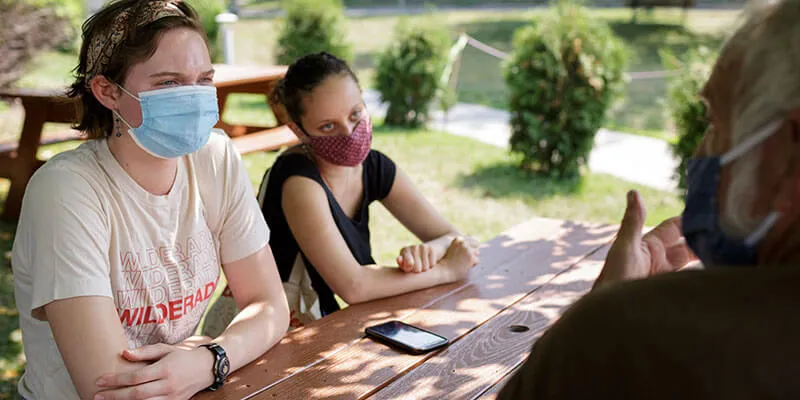When the Waterbury Record printed its final issue this spring, the small vibrant community of 5,000 people it served was left with no local news source.
Today, thanks to students interns at UVM’s Community News Service (CNS) — an extension of the university’s new Reporting and Documentary Storytelling minor — this central Vermont town is once again connected to local news and stories through a recent digital news website and e-newsletter established by student interns, the Waterbury Roundabout.
“Covering this community allows me to learn and create connections with real people, connections I would not be able to make normally,” says Indigo Glaza '21. “I've really grown to appreciate this side of local news reporting, especially during this pandemic.”
The digital news website and bi-weekly e-newsletter, designed by Julia Bailey-Wells '20, is taking off with more than 900 Waterbury residents subscribed to receive the town’s local news in their inboxes. The Waterbury Roundabout has broken stories about diversity in the school system, the new compost program and local transportation projects, while a video of a construction worker braving high winds on Main Street has been viewed more than 100,000 times on Facebook.
For students enrolled in the Reporting and Documentary Storytelling minor, getting the story means getting out of the classroom. At a political rally, Kate Fain '19 (left) and Monica Drimbarean ’19 (with cell phone) interview Becca White '19 (right), one of Vermont’s youngest legislators. (Photo: Glenn Russell)
The students joined long-time local editor Lisa Scagliotti — editor of CNS — and a team of Waterbury residents to bring back local reporting in the area and establish the Waterbury Roundabout. Of the fifteen students interning for CNS this summer, three are working closely with Scagliotti to cover the Waterbury beat, pounding the pavement with spiral notebooks in hand, to find stories. Local news has been under attack from many directions due, in part, to competing social media bubbles and advertising losses to Google and Facebook. With more than 1,300 counties in the U.S. now categorized as media deserts, with no local news, these internships and CNS help to fill a pressing need while giving students the hands-on reporting experiences required for the new Reporting and Documentary Storytelling minor.
“It’s been an amazing experience,” says Bailey-Wells, who won a prestigious summer grant from the Ian Worley fund to support her internship at CNS. As an environmental studies student with a minor in computer science, her combined writing, editing and web development skills help to ensure the outlet’s success.
And the Waterbury Roundabout doesn’t stand alone; a second digital news website built by Bailey-Wells, the Winooski News, has brought local news back to Vermont’s most diverse community for the first time in fifteen years. Now, twice a month, thanks to student reporters Laura Meyer '22 and Jenny Koppang '22, and digital editor Aidan Seipke '22, residents now enjoy a biweekly e-newsletter focused on their own community.
“I'm excited to be covering the local news of Winooski because it's such a unique and diverse community,” says Koppang. But the work has not always been easy. “I spent what felt like the hottest day of the summer prowling around Winooski parks looking to get a person-on-the-street interview. I finally set my sights on a mother and her young child and proceeded to pursue them into the woods. I felt like a huge creep, but it ended up being a terrific interview!”
Telling stories that matter to the community starts with speaking to members of the community, even right here on campus. Liam Creaser '20 stopped by UVM Bikes for an interview with a mechanic for an assignment for The Other Paper. (Photo: Glenn Russell)
“Larger news networks don't tell people about what is directly going on around them,” says global studies major Olivia Nye '21. “And local news is a way to submerge people in their own surroundings.” Nye is reporting on the small town of Hinesburg, a rural counterpart to Winooski, writing about local food, farms and restaurants, most recently for the Hinesburg Record.
Koppang echoes that sentiment. “I believe it's critical, especially today, that residents have access to a reliable local news source to inform their decisions and the way they interact with their environment and each other,” says the Winooski reporter.
“When I was working on one of my first articles,” Glaza says, “the interviewee stopped the conversation in the middle of answering a question and asked me how long I had been doing journalism. I had expected some kind of criticism or something of the sort, but instead I got praise and genuine interest in who I was. Here we were, two random people who had never met having a conversation, a genuine one. I felt at that moment the humanity of journalism, and knew that I had an obligation to tell this persons’ story well, to give it justice.”
